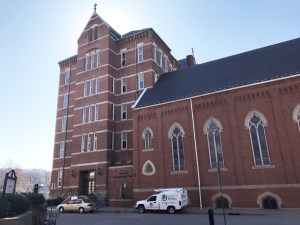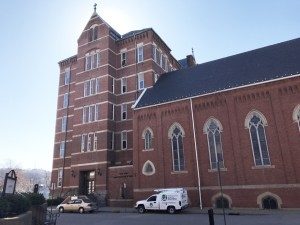

By Gabriella DiPietro | Features Editor
Duquesne’s campus seems to be ever-changing and evolving — a trend that will continue as the university adds a medical college to the mix.
The university announced that it will be launching a College of Osteopathic Medicine, which will be the second medical school in Pittsburgh and the first Catholic osteopathic medical school in the state. The college is set to open and accept its first class in the fall semester of 2023.
To accommodate the expansion of university programs, Duquesne plans to construct an 80,000 to 100,000 square-foot building on Forbes Ave. to house the new medical college. The program, which consists of four years of study followed by a residency, will admit an initial class of 75 in fall 2023 and is expected to take another five years before reaching full maturity at an estimated 600 medical students or more.
“Given Duquesne’s broad strengths in elements connected to integrative health — in pharmacy, nursing, the natural sciences, health sciences and even in business and music — we are exceptionally well suited to serve this need in our region,” Duquesne President Ken Gormley said in a news release.
Doctors of osteopathic medicine primarily serve as family or general practitioners, which strongly aligns with the university’s Catholic and Spiritan values, according to Duquesne University Provost David Dausey.
“The idea for the medical college is embedded within the mission of the university,” he said. “Osteopathic medical doctors seek to treat the mind, body and spirit as we seek to educate the mind, body and spirit.”
Planned for during the creation of Duquesne’s 2018-2023 strategic plan, Reimagining Duquesne’s Spiritan Legacy for a New Era, the medical college will be the university’s 10th school, in addition to the already existing schools of business, education, health sciences, law, liberal arts, music, natural sciences, nursing and pharmacy. The university intends for all to go hand in hand, creating interprofessional training across all programs.
“The College of Osteopathic Medicine will be a hub, synthesizing in some ways all that we do well,” Dausey said. “Because integrative health demands cultural competencies, liberal arts is also involved. We have a music therapy program here. The connection between law and medicine has many tentacles. Education is as much about wellness as it is about knowledge, and business concerns can both aggravate and ameliorate health challenges. The medical college will have ties to every school on campus.”
In order for this college to become a reality, however, it must find a dean. Duquesne is kicking off the search this month for a founding dean, with the help of a national search firm.
“We are looking for a medical leader who understands Duquesne University’s mission and who is an expert on integrative health approaches to medicine,” Dausey said. “At the core, we seek a leader to educate medical students to look at the mind, body and spirit of their patients, to be with them and to listen to their concerns. While such practice certainly is about curing, it is equally about caring.”
In addition to Duquesne’s highly-ranked programs relating to health and healthcare, there is also a shortage of physicians, as shown in a study published by the Association of American Medical Colleges in April 2019.
“Trends show medical students trained at major academic medical centers tend to practice primarily in medical subspecialties, while osteopaths are more likely to become general practitioners, where the need for more physicians is even greater,” Dausey notes.
During their planning, Duquesne conferred with representatives from regional universities, medical professionals and other individuals in city and state government, and their plans were met with much enthusiasm. Regional hospital officials even noted that with the already existing medical schools in the area, the need for residents and interns is still very high, specifically for osteopathic practitioners.
“This major leap forward for Duquesne, Pittsburgh and our region is a bold move that recognizes how health care requires new kinds of practitioners,” Gormley said.



